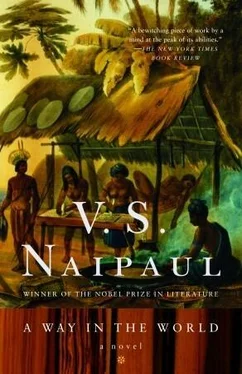I feel now that I was carried away by a private idea of an ancestry, and overlooked too much of what was obvious. There is something in the idea of colonial incompleteness, and his political cause cannot be denied. But Miranda was also, right through, from the time he left home, something of a confidence man. It was too easy: he was the first South American of culture (and often the first South American) people outside had met, and he found he could tell them anything about who he was and the place he had come from. He could tell the president of Yale, for instance, during a discussion of Mexican writing, that he had studied law at Mexico University.
This is the man we will see arriving — in latish middle age, thirty-five years after he had left South America — in the Gulf in 1806. And it is necessary now to go back and understand a little more of Miranda the confidence man.
He was born in Caracas in 1750. His father was a Canary Islander and a linen merchant. That is, neither a proper Spaniard from Spain, nor someone accepted by the creole Spanish aristocracy. But a rich man, rich enough to pay eight thousand pesos — a large sum — for a captain’s commission for his son in the Spanish army; and rich enough to get a notary in Spain to prepare a genealogical account of the Mirandas, proving their Castilian purity and nobility through seven generations.
It is to take up this commission that young Miranda leaves for Spain in 1771. In Spain he is enthusiastic for the sights, the wine, the prostitutes; he notes down everything. To cover some of his expenses (and this might be his merchant father’s idea) he has brought four hundred and fifty pounds of cocoa beans — no doubt grown on the slave estates in the valleys north of Caracas. The cocoa fetches a hundred and fifteen pesos. This — to give an idea of the extravagance of the metropolitan life Miranda is hoping to enter — is what he pays for a silk handkerchief and a silk umbrella. And these are only two items in a long list of expensive dress things which he acquires on arrival.
A year later he receives his commission. He quarrels with people all the time. It is his nature; he is at once too assertive and — no doubt as a Venezuelan and Canary Islander — too easily slighted. However, the years begin to pass; there is a period of service in North Africa. As he settles into regimental life — he is imprisoned at least twice for insubordination — his assertiveness begins to show in other ways. On the parade ground one day he uses his sword to hit a soldier about the head and he damages the man’s hearing; then he has the man taken down to the dungeon, stripped naked and beaten. He also begins to steal the regiment’s funds. The practice is not unusual among officers who have bought their commissions and have in various ways to make their money back. There are complaints, delayed enquiries, rambling written excuses — much of the rest of Miranda’s military life will be like this.
There is now the American War of Independence. Miranda very much wants to go, and he does. He is with the Spanish force at the siege of Pensacola. After the outnumbered British forces surrender, Miranda does some shopping. He buys three Negro slaves and a large number of valuable books. He buys the slaves one at a time in the course of two weeks and keeps the three receipts among his papers; the receipts are proof of his title. He also says that a British prisoner made a gift to him of a Negro man called Brown. These four slaves will be taken as contraband (no doubt on a Spanish military transport) into Cuba or some other Spanish territory and sold at a profit. There are pickings of this sort for Spanish officers in this war.
More is to come. The governor of Cuba cooks up a scheme. Miranda will be gazetted a colonel and sent to the British island of Jamaica to arrange the exchange of British and Spanish prisoners. The mission is genuine enough; but Miranda will also (after squaring the British authorities) buy two ships in Jamaica, load them up with Negroes and British china and linen, and take them back to Cuba. There everything (including the ships: a master stroke) will be traded. Miranda will be set down at the port of Batanabó with his harmless personal luggage (including the many fine books he has bought in Jamaica); the contraband ships and their cargo will make their own roundabout way to Havana. Miranda will take all the risks. The governor of Cuba, the patron of the scheme, will keep his hands clean.
It is a stupendous fraud, hard to keep secret, and there are Spanish officials who are outraged by it. Almost as soon as Miranda leaves Batanabó, with his six trunks in three carts, he is arrested and quite deliberately roughed up by excise officers. No respect is shown to his uniform or to his official passport. His excuses are ingenious, as always, but they don’t help. The officials are implacable; even the governor is bypassed. The case — developing over twelve months — goes to the king of Spain, and the news that gets back to Cuba is so bad that Miranda decides to run. With the help of the governor he gets a berth on an American sloop and slips away to the United States. And that is just as well. The king of Spain’s decision, six months later, is that Miranda is to be stripped of his commission and sentenced to ten years of garrison duty in Oran in North Africa.
By this time Miranda, in the United States, is mingling with the highest in the land. The governor of Cuba has played fair with him; he has given him a letter to the Spanish minister to the United States, and the Spanish minister diligently introduces Miranda to distinguished people. For the first time in his life Miranda finds himself of interest as a South American and a cultured man, as a man in his own right; no one in the United States in 1783 would know or care what a Canary Islander or a Venezuelan creole is. And delicate gifts of social manoeuvre come to Miranda; it is as though he has been educating himself for this moment. At one gathering he says that the military man he has modelled himself on is General Wolfe. It just happens — and no one is more surprised than Miranda — that the man he says that to knows highly-placed friends of the general. Miranda is passed on to those friends; they pass him on to others. And so it goes on for a year and a half.
At some stage the idea gets around that Miranda’s interest, or long-term cause, is an American-style freedom for Spanish America. The idea adds to Miranda’s dignity; and he doesn’t reject it. So when word arrives that Miranda is really a deserter from the Spanish service, it does him no harm. When he leaves the United States to go to England he has a letter of introduction to the secretary to the Treasury in Whitehall. He has moved very fast. Just eighteen months before, in colonial Havana, he was a contrabandist and a deserter; now, already, in London, he has become a kind of negotiator in the South American cause. And twenty years or so later Venezuelans, with colonial pride and exaggeration, will add a further gloss to Miranda’s time in the United States: they will make him a general in the American War of Independence, standing shoulder to shoulder with Lafayette and Washington.
Miranda’s travels continue, year after year: this has almost become his career. There is always someone willing to provide the would-be liberator with money. As for passion, there are constant brutal passages with chambermaids, servant women, prostitutes. There are also constant quarrels with servants. They often seem to sniff out his fraudulence or dependence, and he, with his Venezuelan-colonial ideas of authority, often roughs them up. At the upper level there continue to be introductions, onwards and onwards. The farther away from home he goes the easier it gets.
In Russia he becomes a colonel again, a Mexican nobleman, and a count. Catherine the Great herself becomes worried about what the Inquisition might do to him if he falls into Spanish hands. When he tells her that the Spanish ambassador has been challenging his right to call himself a colonel, she makes him a colonel in the Russian service. She gives him money; she tells him that the Russian embassies in Europe will always be open to him.
Читать дальше












